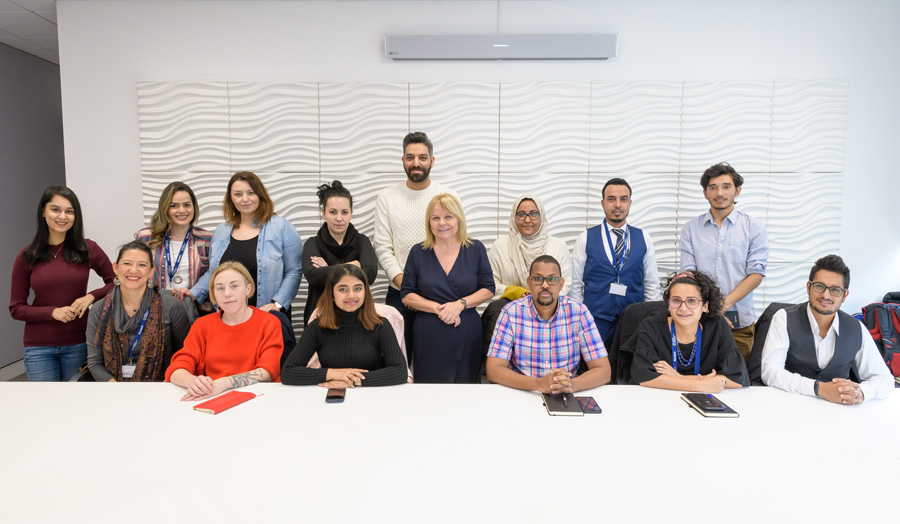Apply for this course
Please select when you would like to start:
Use the apply button to begin your application.
If you require a Student visa and wish to study a postgraduate course on a part-time basis, please read our how to apply information for international students to ensure you have all the details you need about the application process.
Why study this course?
Future-proof your career. Develop key capabilities like critical thinking, problem solving and communication. You’ll also build your knowledge and understanding of global organisations.
You’ll develop your understanding of business operations and the external factors affecting organisations, plus how to navigate business decisions in a changing environment.
We're sixth in the country for producing the most CEOs and managing directors, according to a study by Hitachi Capital Invoice Finance.
Our business and management courses are ranked first for teaching quality in the Guardian University Guide 2023.
Sixth in the country for producing CEOs
We're sixth in the country for producing the most CEOs and managing directors, according to a study by Hitachi Capital Invoice Finance
First in the UK for teaching quality
Our business and management courses are ranked first for teaching quality in the Guardian University Guide 2023
Learn from experts in the business management industry
You will be taught by industry specialists in finance, strategy, creativity, marketing, operations coaching and networking, who have years of practitioner experience
Course modules
The modules listed below are for the academic year 2025/26 and represent the course modules at this time. Modules and module details (including, but not limited to, location and time) are subject to change over time.
Year modules
Breakthrough Leadership Skills
This module currently runs:autumn semester - Monday morning
autumn semester - Wednesday evening
autumn semester - Wednesday afternoon
(core, 20 credits)
The module equips students with a range of skills and knowledge essential to thinking and acting effectively as an inclusive leader. Students will review concepts and cases enabling the critical evaluation of organisational and team design for high performance.
Increasingly, change and leadership go hand in hand in organisations and leaders constantly need to drive change as part of their role. The module will examine the nature and some of the inherent challenges of organisational change. Students will critically analyse what it means to be a change agent and they will gain the knowledge and understanding needed to design, initiate and lead change in diverse organisational settings.
Organisational culture has been described as the third interdependent element in an organisation alongside its Strategy and Operational model. Students will critically evaluate how Organisational culture can be used by leaders to engage the emotional commitment of workers to the strategy and to the operational logic of different organisations.
Effective leaders need to demonstrate self-confidence and self-awareness. Students will undertake a process of self-evaluation using the Strengthscope tool. They will be able to identify their ‘Significant Seven’ strengths and harness these to construct a personal development plan for career development.
The module will also equip students to perform better in the team-working, cross-cultural contexts that are typical of contemporary workplaces and in settings requiring emotional intelligence, enhanced coaching skills and negotiation skills.
Critical to the value of the module is the encouragement of continuous learning and reflection.
Building Business Insights
This module currently runs:autumn semester - Monday evening
autumn semester - Monday afternoon
autumn semester - Thursday evening
spring semester - Monday evening
spring semester - Monday afternoon
spring semester - Thursday evening
summer studies - Monday evening
summer studies - Monday evening
summer studies - Monday afternoon
summer studies - Thursday evening
summer studies - Thursday afternoon
(core, 60 credits)
This module provides students with the opportunity to work on specific management and business problems that organisations are facing,utilising their problem-solving skills and competences of handling and managing business challenges. Starting from problem identification and concluding with solution related recommendations, thus encouraging research into real world business and management issues impacting organisations.
Building Business Insights brings together the learning processes from the whole MBA programme. It encourages the synthesis of knowledge, theories and skills developed in the modules during the previous terms in order to provide realistic solutions to contemporary business and management challenges.
Educational Aims
This applied module aims to allow students to:
• Integrate their prior knowledge into an in-depth investigation of specific management and business problem or issue and present the results
• Facilitate the identification of topical issues in the business/management area of interest
• Assimilate theories and concepts drawn from different areas and the wider business/management literature
• Develop and implement strategies in information gathering, analysis, and synthesis, and in building compelling arguments
• Apply reflective practice, ensuring models and concepts can be used effectively in the critical evaluation of your performance.
• Synthesise knowledge, experience and reflective practice to continually develop professional skills and competences.
Examples of projects that you might consider include:
• Evaluation of an opportunity to enter a new market. This might be an international market where there is as yet no competition, a new value proposition for an SME, or an innovative start-up
Analysis and evaluation of a current management or business issue using the problem solving methodology, in a business sector you are interested in
• Evaluation of a specific firm’s strategy and performance e.g. how an energy firm such as BP is responding to climate change, or an automotive company responding to the impact of shared ride platforms on car ownershipAnalysis of disruption in an industry and the implications for a specific incumbent e.g. how should used car dealerships respond to the impact of online marketplaces like We Buy Any Car and MotorwayAnalysis of the impact of technology change on a company, industry or sector e.g. how are bots impacting online sales of scarce products such as limited availability fashion or tech productsAnalysis of trends to create potential strategic scenarios for a firm or industry e.g. what are the future scenarios for car manufacturers in terms of the next dominant designAnalysis of competition in a specific market or industry and recommendations for a specific company e.g. global competition in the rapidly growing e-scooter industry.Creating a business plan for a new business.
Business Problem Solving
This module currently runs:autumn semester - Monday morning
autumn semester - Tuesday morning
autumn semester - Wednesday evening
autumn semester - Wednesday afternoon
spring semester
spring semester
spring semester
(core, 20 credits)
This module will enable students to build skills and knowledge in problem solving and research that will support their studies throughout the programme and provide the essential foundation for their final project. In addition to developing problem solving skills students will develop a proposal for their final project that will completed during the final term of their course.
This module will help prepare students to become well-informed and effective managers, business owners and entrepreneurs able to lead, manage and solve problems in dynamic and complex environments. The emphasis is on the practical skills of problem solving, critical thinking, presenting proposals, researching, analysing and making recommendation for a senior management or executive audience.
The aims of the module are to ensure that students:
• have a range of tools and frameworks for solving complex problems
• appreciate the challenges in generating relevant evidence that improves business decision making and performance
• can critically evaluate business research and consultancy findings and reports
• can assess the ethical and access issues of conducting business consultancy and research in business and can plan accordingly.
• can apply suitable project planning methods to problem solving and consultancy
• can work through and plan for the practical challenges of business problem solving, including defending choices on the data gathering and analysis approach
The module is intended to prepare students to critically read and evaluate research and practice within their chosen field of study
Read full detailsDigital Business Delivery
This module currently runs:spring semester - Monday morning
spring semester - Wednesday evening
spring semester - Wednesday afternoon
(core, 20 credits)
A business adds value through its operations, which today are typically highly dependent on the use of digital technology to link together organisations within the value network, connect with customers, improve delivery, personalise products and services, and match demand and supply. It is vital that managers and leaders understand both how business operations are designed, managed and improved, and the relationship between new product/service development and operations.
The potential for AI, the Internet of Things, big data and robotics to further increase the use of technology in the operational domain is already clear, whether using AI in legal process or robots to make burgers. An understanding of the links between technology and operations is critical for anyone aspiring to be a business manager, owner or entrepreneur.
Throughout the course of the module consideration will be given to the need for businesses to reduce their impact on climate change and to operate in a sustainable and ethical manner.
The module aims to:
• build knowledge and understanding of the key challenges of building and managing operations and technology systems
• strengthen awareness of the importance of reducing contributions to climate change and the current and emerging means to achieve this goal in business operations
• build knowledge and understanding of the role played by people in operational delivery including Lean and Agile working
• equip students to be able to analyse and recommend improvements to the operation of a business system, whether a start-up or a well-established enterprise
Financial Decision Making
This module currently runs:autumn semester - Monday morning
autumn semester - Wednesday evening
autumn semester - Wednesday afternoon
(core, 20 credits)
This module aims to provide practical methods and approaches to enable business managers and entrepreneurs to understand and use financial information to make effective business decisions. The financial decision-making process demands the understanding of key financial management issues, performance indicators and methodologies to critically analysing accounting and financial information. Strong financial literacy is essential in business.
The module also aims to introduce and examine the preparation and use of accounting and information to inform financial decisions. It provides the understanding of key performance indicators, cashflow management, full costing, working capital management techniques and the budgeting process to manage finances and support management decisions on investment projects and making capital investment decisions. The module concludes with a practice of developing business plan, capital investment decisions and aspects of financing businesses.
The module aims to enable students to be able to:
• ask insightful questions of their financial advisors, to challenge their analysis and to specify their financial information needs
• quickly assess accounting information to evaluate business performance
• create financial forecasts, plans and models, particularly in relation to business planning and investment appraisal.
Global Strategy and Innovation
This module currently runs:spring semester - Monday morning
spring semester - Wednesday evening
spring semester - Wednesday afternoon
(core, 20 credits)
Firms operate in very different ways, however, they share a common business and industry environment and often will both compete and collaborate. All sizes and types of businesses must understand their industry environment as they position themselves for success.
This module focuses on the strategic skills and knowledge needed by executives, managers, intrapreneurs and entrepreneurs and aims to:
• develop the understanding and skills in strategy development and in execution
• provide the knowledge and skills to scan, analyse and interpret firm business environment
• develop skills in understanding trends in the business environment and to construct scenarios that can be used to test strategy
• develop the ability to manage resources and capabilities and to critically evaluate their importance as sources of sustainable competitive advantage but also as potential sources of disadvantage when disruptive innovation occurs
• take strategic decisions based on a deep understanding of their business and the market or markets they serve
• foster and exploit innovation through the development of new products and services
• critical awareness of the importance of environmental and social responsibility, ethical decision making and the need for effective corporate governance.
A key element of the module is participation in the business simulation in which students will compete against each other in teams within in a simulated global market place. This will provide the opportunity to role play executive positions in a global business, take strategic decisions and gain rapid feedback on their validity.
Read full detailsMarketing in the Digital World
This module currently runs:spring semester - Monday morning
spring semester - Wednesday evening
spring semester - Wednesday afternoon
spring semester - Thursday afternoon
(core, 20 credits)
Marketing is important for all organisations and is concerned with retaining customers and delivering value to stakeholders, that is, to everyone who is affected by a transaction. It directs organisations into new markets and opportunities while maintaining and developing existing customers. This module is intended to help develop knowledge concerning the nature and character of marketing as well as sales in an international context, capitalising on current and emerging technologies.
The interdependence of economies and increasingly globalised marketing reflects the trend of organisations designing, distributing and selling products and services in many markets around the world.
The primary role of marketing management in any organisation is to design and execute effective marketing programmes in local, international and global markets,
The module aims to:
• Provide a solid appreciation of marketing as practiced in the international arena.
• Enhance understanding of the relationships between an organisation, the markets it is serving and its key stakeholders.
• Provide an integrated overview of marketing management, using topical issues, thought leadership and research findings.
• Offer a broad platform of marketing concepts, theories and frameworks, which can be applied in practical situation
• Explore the impact of the drive towards digital applications and delivery

















.jpg)




